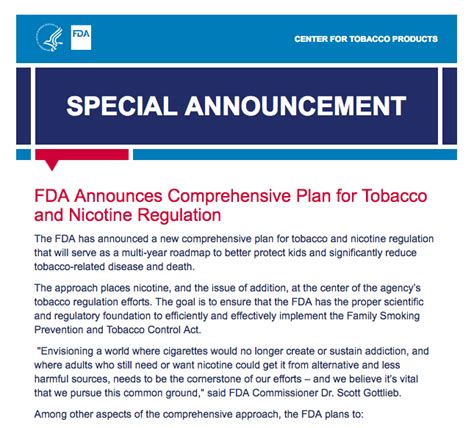Smoking is a deeply ingrained habit for many individuals. The act of lighting up a cigarette, taking that first puff, and feeling the nicotine rush has become a routine part of daily life for millions. However, what if there was a way to break this cycle? What if cigarettes were designed to provide less of the addictive chemical that keeps people hooked – nicotine?
The U.S. Food and Drug Administration (FDA) has proposed a groundbreaking rule aimed at drastically reducing the amount of nicotine in cigarettes and certain other combusted tobacco products. This bold move is driven by the desire to help smokers kick their deadly habit by gradually weaning them off nicotine.
The Science Behind Reduced-Nicotine Cigarettes
Nicotine, known for its highly addictive nature, is the primary culprit that maintains smoking addiction. Megan Piper, a research director at the University of Wisconsin Center for Tobacco Research and Intervention, explains that cigarettes are crafted to deliver maximum nicotine without causing immediate sickness, ensuring users remain dependent on them.
Regular cigarettes typically contain around 16 milligrams of nicotine per gram of tobacco. In contrast, the FDA’s proposal aims to slash this amount significantly to just 0.7 milligrams in both cigarettes and other combusted tobacco products.
Numerous studies have delved into how smokers respond when using reduced-nicotine cigarettes versus regular ones. Excitingly, research indicates that individuals using lower-nicotine options smoked fewer cigarettes per day compared to those using traditional ones. This reduction amounted to about five or six fewer cigarettes daily – a significant step towards curbing smoking habits.
Empowering Smokers Towards Freedom from Addiction
Quitting smoking is notoriously challenging due to withdrawal symptoms like depression, anxiety, irritability, and sleep disturbances triggered by cutting back on nicotine intake. These discomforting experiences often deter individuals from attempting to quit altogether.
However, reduced-nicotine cigarettes offer a promising solution. Despite containing significantly less nicotine than regular counterparts, users do not feel compelled to smoke more or experience heightened cravings or withdrawal symptoms. This phenomenon can be attributed to the ingrained behaviors associated with smoking – actions like lighting up or inhaling create a psychological satisfaction independent of actual nicotine levels.
Through gradual exposure to reduced-nicotine options and observing diminished cravings and withdrawal symptoms even with reduced smoking frequency, individuals gain confidence in their ability to control their habit. This sense of empowerment plays a crucial role in fostering successful quitting attempts down the line.
Real Stories: How Reduced-Nicotine Cigarettes Spark Hope
In one study published in Drug and Alcohol Dependence in 2021 participants who used low-nicotine cigarettes expressed feeling less controlled by their smoking habits during their trial period compared to conventional cigarette use.
One participant shared their newfound sense of freedom stating “I honestly think I could probably quit.” These testimonials underscore how reduced-nicotine options can instill hope and motivation in smokers striving for liberation from addiction.
A Pathway Towards Smoke-Free Lives
Ultimately, the goal isn’t for individuals to transition from high-nicotine products to reduced versions indefinitely but rather as an intermediary step towards complete cessation . While reduced-nicotine products still contain harmful chemicals present in traditional tobacco , they serve as stepping stones guiding users towards alternative noncombusted tobacco items like e-cigarettes or FDA-approved nicotine replacement therapies .
Quitting smoking is an arduous journey characterized by multiple attempts before success takes hold . By offering diverse strategies such as reduced-nicotine alternatives , smokers are equipped with additional tools aiding them on their path towards lasting freedom from addiction .
It’s crucial for smokers grappling with this formidable challenge not lose hope but instead persist in exploring various methods until they find what works best for them . Remember , every attempt matters , every effort counts , so keep trying because each step brings you closer toward reclaiming your health and well-being .

